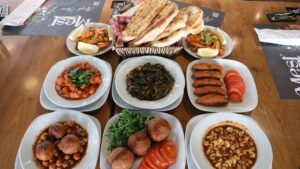Ramadan is a sacred month observed by Muslims worldwide, during which fasting from dawn to sunset is a key component of spiritual practice. While fasting offers numerous health benefits, including detoxification and improved mental focus, it can also put a strain on the digestive system, especially for individuals with existing stomach issues. Prolonged fasting, sudden overeating and improper food choices can exacerbate conditions like acid reflux, gastritis and indigestion. To help prevent these discomforts and promote overall digestive health, it is essential to make mindful food choices and adopt healthy habits throughout the month.
Gastroenterologist Dr. Hasan Gürel emphasized that individuals with stomach disorders may experience an increase in symptoms during Ramadan. He explained that prolonged periods of fasting, sudden overeating, poor food choices and irregular fluid intake could trigger stomach problems. Therefore, it is crucial to consume foods that protect the stomach during sahur and iftar.
Gürel provided dietary recommendations for individuals suffering from reflux and gastritis during Ramadan. He advised selecting foods that are easy on the stomach and help individuals feel full for extended periods. At sahur, foods such as whole wheat bread, oats and bulgur – complex carbohydrates that aid digestion – should be preferred. Additionally, protein sources such as boiled eggs, low-fat cheese and yogurt can protect the stomach and help maintain fullness. Gürel also recommended consuming fiber-rich foods like lentil soup or vegetable dishes.
He stressed the importance of balanced water intake, avoiding excessive consumption and steering clear of spicy and fatty foods, processed items like salami and sausages, as well as caffeinated beverages.
Protecting stomach
Gürel discussed important steps to avoid overloading the stomach during iftar. To protect the stomach from sudden strain, he suggested breaking the fast with dates, followed by warm water and a light, low-fat soup. For the main meal, steamed vegetables, grilled chicken or fish, and low-fat rice or pasta are recommended as stomach-friendly options. Portion control is essential — overeating can strain the stomach. A few hours after iftar, light fruits like bananas or pears, which are gentle on the stomach, can be consumed. He also pointed out that acidic foods like oranges, tomatoes, onions and garlic may irritate the stomach. Fried foods, fast food and spicy dishes can trigger acid reflux, while carbonated drinks, chocolate, coffee and mint can increase stomach acid and lead to discomfort.
Gürel advised against lying down right after meals, especially during Ramadan. To maintain a healthy digestive system, meals should be consumed regularly and eaten slowly and thoroughly. After eating, it is important to wait at least one hour before lying down. Keeping the head elevated during sleep may help reduce reflux symptoms. Light exercise and stress management also play a role in protecting stomach health. Additionally, he recommended consulting with a doctor regarding medications taken while fasting.




















































Be First to Comment